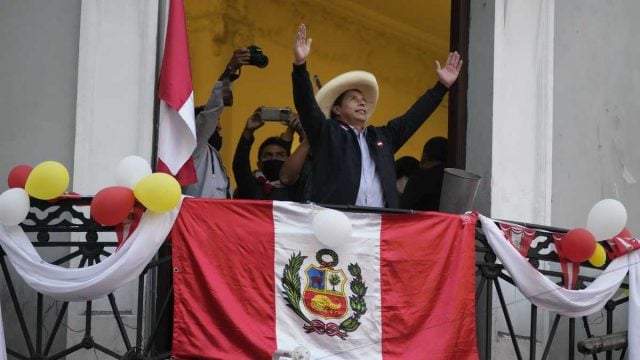A week after assuming the presidency of Peru, Pedro Castillo faces strong pressure from the partisan and media opposition to change his cabinet due to the alleged ‘lack of suitability’ of several of the designated officials, which has unleashed a climate of confrontation between the Executive and Legislative powers.
The political tension in the country intensified after the Ombudsman, Walter Gutiérrez, sent a letter to Castillo in which he pointed out to the president the need to reassess ministerial appointments based on constitutional principles, explains journalist Cecilia González in a report for RT.
«It is up to him to overcome this crisis, avoiding exacerbating polarization of society. We have asked for an appointment», he said, underlining the importance of the positions being filled by leaders who have strong convictions in the field of human rights.
«He who does not believe in equality, who is misogynistic, homophobic, who does not believe in equal rights for women does not embody the country’s policies and cannot lead them», he asserted.
Gutiérrez recalled that terrorism «is a scourge» that has affected the country’s institutions and the human rights of the most vulnerable people, making it unfeasible for politicians who have defended terrorists to occupy a public position. He thus referred to the Chief of Staff, Guido Bellido, who has an open investigation for alleged instigation of terrorism of which he has already demarcated himself.
«We sent a document to the office of the presidency. We say to him with respect but with great clarity, that although he has full power to elect his ministers, he is obliged to filter constitutional standards and public ethics. We are talking about the public administration, not a private body, therefore, particular care is needed when appointing cabinet members», said the defender.
In a clear warning, Gutiérrez said that the president has the opportunity to correct the appointments and must remember that the exercise of power is «limited and temporary» and that, in his case, there are institutions such as the Comptroller’s Office and the Office of the Ombudsman with authority. to control the rulers.
Peru and the power of Congress
The lack of definition about the Cabinet generates a climate of uncertainty because in Peru Congress must endorse appointments with a vote of confidence. In the event of a rejection, the president has to make new appointments, but if they are censored again, then Castillo would have the power to dissolve Congress.
In fact, that was what former president Martín Vizcarra did in 2019, but a year later the new parliament removed him from office, in a process plagued with irregularities that led to a serious political crisis.
Today there are already opposition politicians and journalists who threaten Castillo that, if he does not change the cabinet, Congress will initiate a process to declare a «vacancy due to moral incapacity» against him, the same as the one suffered by Vizcarra.
To support his officials, the president needs the vote of confidence of 66 of the 130 congressmen, so Bellido has already begun to negotiate with the different opposition banks. The Fujimorista Fuerza Popular bloc, which has 24 seats, has already rejected any type of dialogue with the government in advance.
Bellido’s first major task as Chief of Staff is to seek support for the appointments, but the problem is that he is the main official questioned, since a prosecutor accused him of «apology for terrorism», after he refused to classify Sendero Luminoso (Shining Path) as a terrorist organization, during a television interview. In addition, in 2017 he published a post in tribute to the senderista leader Edith Lagos.
However, Bellido affirmed at a press conference that neither he nor any of the ministers chosen by Castillo had or has any link with terrorist groups and he sharply dissociated himself from both the Sendero Luminoso and the Túpac Amaru Revolutionary Movement.
“They can investigate 500,000 times, we have never made an apology for terrorism, never. I flatly deny that and we have already turned the page», he said.
But the Chief of Staff also has a history of homophobic and misogynistic posts on social networks, in which he assures that «women are so destructive and ruthless when it comes to mixing their grudges and selfishness» or that feminism «is a cancer».
Other complaints
The opposition in Peru has endeavored to seek all kinds of accusations, whether or not they are well founded or to a certain degree, in order to challenge the cabinet and promote its censorship.
One of the scandals broke out this week, when the Public Ministry revealed that it had initiated an investigation against the new Minister of the Interior, Juan Manuel Carrasco Millones, for alleged «misconduct» and incompatibility in office, since he did not resign early from his post as a public prosecutor and from which he had only obtained a temporary license.
On the other hand, the opposition newspaper La República assured that the Minister of Labor and Employment Promotion, Iber Maraví, has ties with César Tito, a leader who leads the demands for the release of the former leader of Sendero Luminoso, Abimael Guzmán, and other terrorists. This has been denied by the new official.
They ‘discovered’ that the Minister of Transport and Communications, Juan Silva Villegas, had traffic fines, and that the Minister of Defense, Walter Ayala Gonzales, had received a disciplinary sanction 24 years ago.
Foreign Minister Héctor Béjar, meanwhile, is challenged because he was a guerrilla in Cuba, along with Fidel Castro and Ernesto ‘Che’ Guevara, and later in Peru he participated in the Movimiento de Izquierda Revolucionaria (Revolutionary Left Movement) and founded the Ejército de Liberación Nacional (National Liberation Army).
In addition, in general terms, criticism of the cabinet has focused on the almost null gender parity, since Castillo only appointed two women among the 19 ministries: Vice President Dina Boluarte, in Development and Social Inclusion, and Anahí Durand, in Women and Vulnerable Populations.


